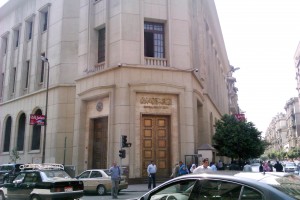
(Abdelazim Saafan/DNE Photo)
The Central Bank of Egypt’s Monetary Policy Committee lowered its main overnight interest rate by 50 basis points on 1 August, taking the overnight deposit rate to 9.25% and the overnight lending rate to 10.25%.
According to a statement on the bank’s website, the discount and repurchasing rates and deposit operations are now lowered to 9.75%.
“Due to the influx of gulf aid that Egypt received last month, prices have been stable, and demand on money has been reduced, so this is not at all surprising news as was reported,” said Ashraf Sharqawi, chairman of Egyptian Financial Supervisory Authority.
“All economic indicators have suggested rates should change,” he said.
A few days after the military deposed former president Mohamed Morsi following nationwide protests, Saudi Arabia and the United Arab Emirates pledged a total of $8bn in aid. A day after the lenders’ aid announcements, Kuwait also pledged an aid package of $4bn to support the troubled economy.
Sharqawi emphasized that such aid will essentially boost net foreign reserves, despite no announcements being made yet by the central bank.
On 16 July, leading credit rating agency, Moody’s, deemed the gulf lifelines “credit positive” despite their “temporary” nature.
“These packages are credit positive because they will have the immediate effect of offsetting pressures on Egypt’s balance of payments by substantially bolstering official foreign exchange reserves,” the report stated, explaining that investors prefer a more democratically-acting government, which will possibly increase foreign direct investments and aid in the coming months.
The net foreign currency reserves, necessary to purchase basic imports, primarily wheat, reached $14.9bn in June compared to $36bn on the eve of the January 25th Revolution.
Because of the dwindling reserves, the bank has restricted access to the scarce US dollar since December, and attempted to curb a run on the pound by hosting dollar auctions to halt the sale of foreign currency. The auctions are aimed at rationing the supply of dollars and giving priority to staple food imports.
In March, the central bank’s Monetary Policy Committee announced a 50 point rate increase taking the overnight deposit rate to 9.75% and the overnight lending rate to 10.75%.
That increase was prompted by a jump in the headline inflation in February, which registered 8.2% compared to 6.3% in January. In June, the country’s annual inflation jumped significantly to 9.8% compared to 8.2% in May and 8.1% in April.
“The committee will continue to closely monitor all economic developments and will not hesitate to adjust the key central bank rates to ensure price stability over the medium‐term,” the bank said in a statement in March.
According to a statement on the bank’s website, the discount and repurchasing rates and deposit operations are now lowered to 9.75%.




